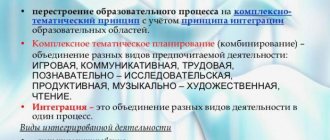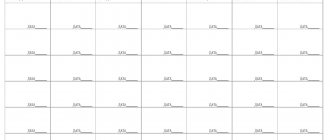Contents of sections of the annual plan
a) Annual objectives. Expected results.
The annual goals of a preschool institution must be formulated specifically and clearly. Their implementation ensures the improvement of the pedagogical skills of kindergartens, the manifestation of creativity in working with children, and the improvement of the joint work of the kindergarten and family in the upbringing and development of children’s individual abilities. As practice shows, 2-3 tasks are actually feasible, so it is advisable to plan no more than two or three tasks.
A clear formulation of tasks makes it possible to determine the degree of their novelty: is the task new or a continuation of work on the task of the last academic year.
Next, the expected results for completing annual tasks with teachers, children and parents are planned.
b) Organizational and pedagogical work
This section plans to:
a) meeting of teachers’ councils;
b) work of the methodological room (equipping the pedagogical process, organizing exhibitions, summarizing advanced pedagogical experience);
c) entertainment events, holidays, theme evenings;
d) holding competition reviews.
The work of the methodological office involves:
• Organization and design of exhibitions (current and permanent);
• replenishment, equipment and systematization of methodological and didactic materials;
•continuity of activities of kindergarten and school;
• equipping the teaching process with educational visual aids, toys, etc.
• development of notes, scripts, preparation of consultations, questionnaires, tests;
• organization of seasonal exhibitions, exhibitions of children's works, new items of methodological literature.
Spectacular events, celebrations and entertainment. The annual plan includes entertainment events, themed evenings, holidays provided for in the program, calendar, ritual and theatrical performances, holding joint holidays with parents, entertainment, and original exhibitions of children's works.
Shows, competitions. It is planned to hold shows and competitions for the best toy made by children together with their parents, for role-playing game paraphernalia, for an interesting craft, didactic and educational toy, etc. For each show-competition, regulations are developed, which are approved by the teachers' council and depend on the needs of the school.
c) Work with personnel.
This direction includes the following types of work.
a) advanced training: participation in problem-based creative seminars; attending courses; participation in city and regional events; participation in the “School of Excellence”, in exhibitions, and participation in advanced training courses.
b) certification. It is planned in accordance with the received applications from teachers for receiving the category. The names of those being certified are entered in the annual plan.
c) work with young specialists. It is planned if there are young specialists in the teaching staff. The content of the plan includes specific measures to provide effective assistance to beginning educators from the most experienced teachers, as well as from the administration: consultations on planning and organizing educational work with children, practical seminars, drawing up notes for conducting classes, performing routine processes, selection methodological literature for in-depth study, preventive control over the work of a specialist.
d) group meetings. The main purpose of group meetings is to provide an analysis of work with children over the past period and determine further tasks in raising children. Group meetings are held in early age groups depending on age: in groups from 1 to 2 - quarterly, in groups from 2 to 3 years - 2 times a year. It is advisable to schedule the first group meeting for November. In September - October, the level of intellectual development of children who entered kindergarten during the adaptation period should be studied and analyzed, and neuropsychic development cards should be drawn up for each child.
e) collective viewings. They are planned once a quarter in order to study the work experience of teachers. The topics of the screenings are determined by the issues discussed at teacher councils, seminars, and the tasks that arise in connection with the study and implementation of advanced pedagogical experience. For collective viewings, it is necessary to provide for problems of the pedagogical process, observation and analysis of not only educational activities, but also other types of children’s activities (cognitive-practical, play, elementary labor, art, communication). It is not advisable to overload the plan with collective views.
e) seminars. They are the most effective form of methodological work. Depending on the specific operating conditions of each control center, theoretical seminars, problem-based seminars, and workshops are planned. They can be one-time (one-day), short-term (weekly); permanently operating.
g) consultations. They are planned to provide pedagogical assistance, familiarize themselves with new teaching material, and also based on diagnostic results. Consultations can be individual or group. Consultations are planned taking into account the relationship with issues of annual tasks, teachers' councils, as well as taking into account the categories of employees and their professional level. The number of consultations depends on the quality level of the teacher’s educational process in groups, as well as on the qualifications and experience of the teacher, but at least once a month. Accounting for consultations and seminars is reflected in a separate notebook according to the following scheme: date, name of the event, topic. Category of listeners, who conducts, those present, the list of those responsible.
h) other forms of work with personnel. In order to increase the level of theoretical and practical knowledge of teachers, as well as their professional skills, the following active forms of work with personnel can be planned: discussions, competitions of pedagogical skills, pedagogical quizzes, pedagogical ring, methodological festival, business games, role-playing games, crosswords, solving pedagogical situations, methodological week, interactive methods and games (“Metaplan”, “Four Corners”, “Weather”, “Complete the Sentence”, etc.).
d) Management and control
The purpose of control is to verify the implementation of instructional and methodological documents, proposals of instructing persons, as well as the implementation of decisions of teachers' councils based on the results of previous inspections. An important task is to study the teacher’s outlook, his spiritual interests, find out how he lives, what he reads, how he follows the achievements of science and culture, what place art occupies in his spiritual life, etc.
When planning various options and forms of control, it is necessary to be guided by the requirements for the implementation of control, namely:
— control must be targeted, systematic, consistent, comprehensive and differentiated.
- it should combine the functions of checking, training, instructing, preventing shortcomings, as well as disseminating the best teaching experience.
— control must be combined with self-analysis, self-control and self-assessment of the teacher’s activities.
There are several types of control: preventive, thematic, frontal, episodic, comparative, operational...
e) Working with parents
In this section, as necessary, various forms of work with parents are planned: parent meetings (general kindergarten - 2 times a year and group - once a quarter), individual and group consultations on current topics, “health clubs”, lectures, conferences, exhibitions and etc.
g) administrative and economic work.
In this section, meetings (once a quarter) of the labor collective are planned, where issues of labor discipline, implementation of instructions, discussion and approval of the work plan for the summer period, etc. are discussed; measures for the rational use of budget funds, creating conditions for organizing the educational process (repairs, purchase of furniture, equipment, etc.); measures for landscaping the territory of the kindergarten, arranging a sports ground, and updating equipment in the areas.


